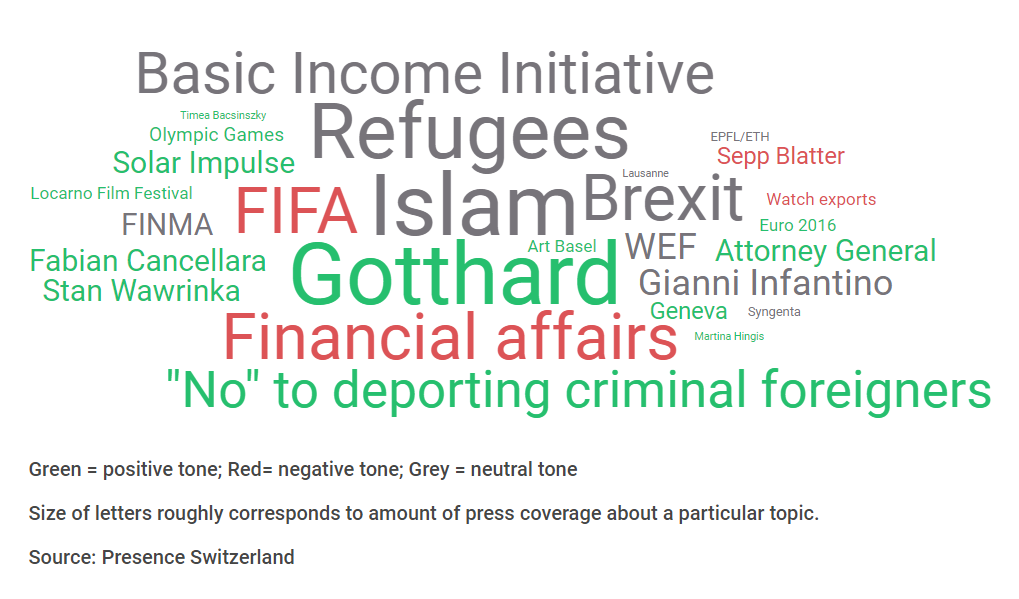
Does Switzerland’s image suffer from bad press?

As the Swiss at home and abroad celebrate their National Day, we look at what the world thinks of Switzerland despite recent negative press over citizenship issues.
Cases of citizenship requests by long-term residents being turned down have frequently made waves in the media abroad – most recently the story of an unlucky 25-year-old Swiss-born woman first published outside of Switzerland by The Guardian in the UK. News outlets around the world soon picked up on her tale, ranging from publications in the woman’s native Turkey to the Netherlands, China and other British media.
The Swiss citizenship process is a perpetual media darling, perhaps since the debut of the 1978 satire “The Swissmakers” which exposed the barriers to becoming Swiss and became the country’s most popular movie of all time. But overall, naturalisation issues are a drop in the bucket in the international media coverage of Switzerland compared to banking, events like the World Economic Forum or direct democracy. Regular analyses of Switzerland’s global press coverage from Presence Switzerland, the promotional arm of the foreign ministry tasked with monitoring the country’s image, bear this out.
Over the past five years, the main critical press coverage involving Switzerland has come over topics like the shady dealings of world football’s governing body FIFA, the Swiss National Bank’s monetary policy, Swiss banks’ activities abroad and the February 2014 vote to limit immigration from the EU that has had significant fallout for Switzerland’s relationship with the rest of Europe.
Migration and religion topics related to Switzerland have found a bit more footing in the global press since 2015, especially last year with reports about asylum and refugees, reactions to a burka ban in canton Ticino and a vote about deporting criminal foreigners. In 2015, “FIFA” and “Sepp Blatter” on the negative side were outweighed by “governance” and “location and quality of life” on the positive side. And last year, positive coverage of the Gotthard tunnel opening outweighed other topics.

In 2014 – the year Switzerland voted to curb immigration from the EU – more than half of those surveyed in a Europe-wide study about Swiss image carried out by Presence Switzerland could not come up with a single negative thing about the country.
So far this year, Presence Switzerland has found that the World Economic Forum, the visit of Chinese leader Xi Jinping, tennis, the automatic exchange of tax information and Swiss-Turkish relations have been among the most-reported topics about Switzerland in the international media.
Citizenship denied
These recent citizenship cases were picked up in the global press but did not significantly affect attitudes about Switzerland, as Presence Switzerland research shows.
Most recently was the aforementioned story of Funda Yilmaz, a 25-year-old Swiss-born woman in canton Aargau who speaks fluent Swiss German and passed her written citizenship test – containing questions on Swiss history, law and tradition – with flying colours. But when it came to her first interviewExternal link with a panel from her town, she didn’t know the names of certain mountains or neighbouring villages, nor why people celebrate Easter, for example. In the end, the panel concluded that “she lives in another world and has no interest in seeking dialogue with Switzerland and its people” and denied her application. (She plans to appeal the decision to cantonal authorities).
In another case last year, a woman from the Netherlands who had lived in Switzerland since the age of eight was twice rejected for citizenship by another commune in canton Aargau. She had repeatedly organised protests against local horseracing, Sunday roasts and various bells in the neighbourhood. She says she was accused of not being integrated in Swiss society because she wanted to abolish these traditions but later admitted she had never considered their value to the community. She was ultimately granted citizenship on appeal, but not before publications from The Independent to The Atlantic had picked up on the story with headlines like “In Switzerland, you can be denied citizenship for being too annoying”.
And then there was the case of a family from Kosovo that had lived in the country for more than a decade and wanted to become Swiss. In its first time rejecting a citizenship application, the naturalisation panel in the family’s commune denied their request after several members felt the applicants did not appear “Swiss enough” in their values and habits. One panelist used as an example the fact that they wore track suit bottoms around town instead of jeans. A week later, an article in Britain’s Independent ran under the headline “Family denied Swiss citizenship for wearing tracksuit bottoms around town”.

In compliance with the JTI standards
More: SWI swissinfo.ch certified by the Journalism Trust Initiative





























You can find an overview of ongoing debates with our journalists here . Please join us!
If you want to start a conversation about a topic raised in this article or want to report factual errors, email us at english@swissinfo.ch.